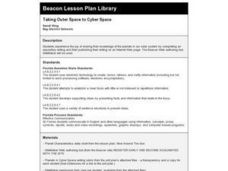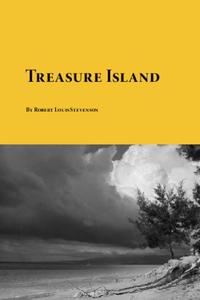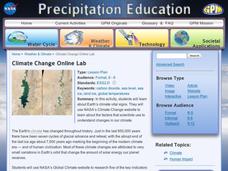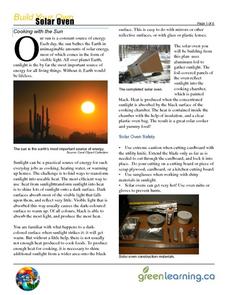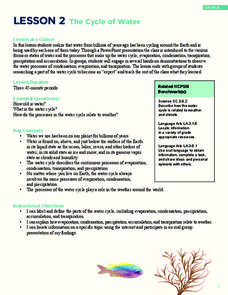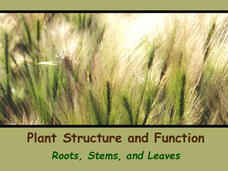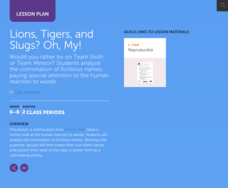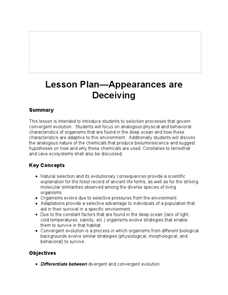Messenger Education
Exploring Solar Systems Across the Universe
Scientists have theorized that our solar system formed 4.6 billion years ago. In this pair of activities, learners first hypothesize how our solar system was formed. Using this information, groups then determine how scientists search for...
Curated OER
Hello, Is Anybody Out There? (cont.)
In this space science worksheet, students read an informative passage about radio waves and the possibility of sending messages in space. The passage describes a "Sounds of Earth" record on the Voyager satellite which contains messages...
American Museum of Natural History
What Do You Know About Earth?
Time to rock and roll! Young scientists test their knowledge about rocks found on Earth and what they tell scientists. A 10-question quiz focuses on the different types of rocks, how they are formed, and what they are made of.
Curated OER
Taking Outer Space to Cyber Space
Use the Internet, write an expository text, and have students share their knowledge of the planets in our solar system. They compose an expository writing piece and publish it to a web page.
Star Date
Modeling the Night Sky
Dramatize the stars and planets as they become a visual representation of the solar system in this activity. Young astronomers track and simulate various constellations as they orbit the Earth to learn the position and motion of...
Curated OER
Sand Travels
Learners examine how sand is formed by erosion and that it can be moved by streams, rivers, and ocean currents in this unit of lessons. They study waves and currents, and structures that change how sand moves by creating story charts,...
International Technology Education Association
Tidy Up Those Sloppy Force Fields!
It is just magnetic. This resource presents the concept of Earth's and another planet's magnetic field and how spacecrafts detect them. Learners study a problem using magnetometers and participate in three experiments to come up with a...
Planet e-Book
Treasure Island
Simple yet convenient: this resource is a real treasure! Robert Louis Stevenson's adventure novel, Treasure Island, engages readers of all ages with its tales of treasure maps, buried gold, and pirates. With a sleek eBook, learners can...
Rhythm Rhyme Results
Whatʼs the Same and Whatʼs Different?
Learn about radiation, convection, and conduction with a multiple choice worksheet. Each question prompts kids to decide what is different about each form of heat energy transfer, and what is the same.
Curated OER
Earth's Water
If the majority of our planet is covered with water, why do we need to bother conserving it? With a thorough and varied investigation into the location and types of water on the earth, learners will gain an understanding of why this...
NASA
Climate Change Online Lab
What are the key indicators that show scientists that our planet is in the fastest warming trend ever? Learners go on a WebQuest to examine the evidence for themselves. Following several links to NASA sites, kids see how the global...
International Technology Education Association
Pixel This!
Did the image I drew match the image you saw? By simulating a satellite and a ground station, teams of two transmit data in the form of pixels in order to recreate an image. They use four different levels of brightness, creating slightly...
Curated OER
Conservation of Energy
Fifth graders examine their use of energy over a certain time period. They come up with a plan to reduce their energy consumption and carbon footprint. Groups of learners complete a chart with three columns; energy-using events, the form...
Green Learning
Build Your Own Solar Oven
This is not exactly a lesson plan, but rather a six-page document detailing how to build a solar oven. A bit of background information, materials list, diagrams and photos, and clearly-written procedures are all included. There are no...
NOAA
The Cycle of Water
Young water cycle enthusiasts discover the water they have been using has been cycling around the earth for billions of years. Through presentations, learners will understand that water has three states and how these forms...
Biology Junction
Plant Structure and Function: Roots, Stems, and Leaves
Scientists found fossils of plants more than 420 million years old—but plants existed for up to 100 million years prior to these fossils. Learn about the importance of plants to the entire planet. Viewing a presentation helps scholars...
Curated OER
Student Reading - The Unique Properties of Water
Without water there would be no life on this planet. Biology learners find out why by reading this handout. Create a worksheet of questions to answer after the reading. Follow it up with quick demonstrations or laboratory activities that...
Scholastic
Lions, Tigers, and Slugs? Oh, My!
Explore the power of words with your class by analyzing the connotations of fictitious sports team names. Learners discuss team names and the mental images they convey. They create logos to illustrate the meanings and...
Curated OER
Lesson Plan - Appearances are Deceiving
Herre is a activity on divergent and convergent evolution. It has links to terrific video clips, an associate worksheet, and more. The analysis questions have been reviewed separately on Lesson Planet if you would like more information....
Curated OER
Slip Slidin' Away
Students investigate mechanical weathering as a form of erosion. In this erosion lesson, students, define weathering and erosion before determining how the Earth's surface is in a constant state of change. They watch a video, access...
Curated OER
Group 15, The Nitrogen Group
This short presentation provides a convenient introduction to the nitrogen group in the periodic table of elements. A graphic displays where they are placed in the periodic table. The nitrogen cycle is mentioned and ammonia is explained....
Virginia Department of Education
The Hydrologic Cycle
There is the same amount of water on earth now as there was when it was formed. The water from your faucet could contain molecules that dinosaurs drank! Young scientists build their own hydrologic cycle model and observe...
Turabian Teacher Collaborative
My Favorite Martian: Workshopping Warrants
Sometimes explaining an argument can lead to confusion and miscommunication. Narrow down the details in written arguments with a group activity in which learners pretend to be aliens from another planet, struggling to understand each...
NASA
States of Matter
Water, one of the basic needs of humans, is found in all three states of matter on Earth; no other planet—that we know of—possesses this quality. Here is a unit that allows learners to explore through experimentation what it...



